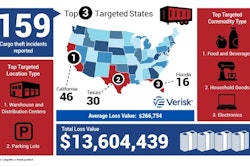As the freight cycle showed signs of recovery, analysts saw optimism in the transportation merger and acquisition (M&A) sector in late 2024 and early 2025, but recent trade policy is stifling momentum, according to a report by management consulting firm Kearney.
Among publicly traded carriers, TFI International (CCJ Top 250, No. 5), which closed two smaller deals this year, said in a call with analysts that it recently paused significant M&A activities due to tariff uncertainty and freight demand concerns.
Knight-Swift (No. 4) CEO Adam Miller also noted that significant M&A is more likely in 2026.
Sector consolidation on the rise
Kearney’s report noted that one of the underlying drivers shaping the M&A market is consolidation across sectors. RXO acquiring Coyote Logistics in 2024 serves an example, as the two companies served different customer segments, but the acquisition allows both to enhance each other’s capability.
Javier Pajaron, senior manager in private equity and transportation & infrastructure at Kearney, said the ongoing freight recession and trade disruptions are hitting smaller carriers and brokers hardest, leading to closures and asset sales.
Kearney’s report also noted that more divestitures are expected as large firms are focusing on core strengths and will be inclined to sell off underperforming or non-core and low-performing divisions while acquiring businesses that expand their core. This was seen with UPS selling Coyote, C.H. Robinson’s exiting from its European business and FedEx announcing divestiture of its LTL business. “We expect to see more of that,” he said.
Specialization drives value
Peter Stefanovich, president at Left Lane Associates, also pointed out that companies most likely to slow or delay transactions are those those operating in sectors hit hardest by current market conditions.
On the flip side, for companies in specialized niche segment, Stefanovich said, “It’s an opportunistic time to look at companies that are looking for an exit at a lower value because the rest of the market is lower.”
Kearney’s report also supported this as strategic buyers are seeking higher margins. Companies are targeting niche, high-margin sectors, such as pharma. A few examples of this include DHL entering the reverse logistics space, and UPS expanding into cold chain and healthcare.
What we’re seeing, Stefanovich noted, is a sharp contrast between the high valuations of the COVID boom in 2020-2021 and the prolonged freight recession that began in Q3 2022 that continues today. “When you add the impact of tariffs, we’re now over two and half years into one of the longest freight recessions in recent memory,” he said.
That level of prolonged volatility is pushing many business owners, Stefanovich said. Even people that weren’t interested in exiting are reevaluating, whether to keep running their companies or to leave the business entirely.
Diversified networks as key assets
Companies with diverse and adaptable logistics networks are becoming increasingly valuable in the M&A market, said Eddie Zukowski, director at PMCF Investment Banking.
“This continual supply chain evolution creates challenges for shippers, resulting in opportunity for logistics providers who have the agility (geographic reach, cross-border capabilities, etc.) and infrastructure (fleet size, warehousing capacity, etc.) to quickly deliver new solutions,” said Zukowski.
Post-COVID realities like frequent bottlenecks, reshoring and shifting trade routes have made resilience and adaptability essential. Zukowski added that companies that can help shippers navigate these challenges stand out in the market, driving stronger growth, better margins and, ultimately, higher acquisition valuations.
“Having that diversified service offering has always been important but has become extremely prevalent as those business have been very valuable targets," said Jonathan Britva, managing director, Republic Partners. "That’s not changing, even during the freight recession when not as many deals were getting done."
Nearshoring and trade lane shifts
Shippers are increasingly reshoring and nearshoring their operations to reduce reliance on overseas suppliers and avoid supply chain risks. “Recent tariff-driven trade shifts could significantly expedite this trend,” said Zukowski.
Shifting trade lanes have and will continue to drive an increase in M&A activity for logistics providers that specialize in international and cross-border services, Zukowski pointed out, such as drayage, final-mile delivery, customs handling, and cross-border warehousing.
As trade lanes change, strategic buyers are focusing on acquiring companies that can quickly adjust to new patterns. On the other hand, Zukowski said firms heavily tied to trade routes facing headwinds (like China-to-U.S.) may struggle as they are forced to redistribute capacity, potentially delaying their sale processes or lower their appeal to potential buyers.
Contingency planning
A huge trend now is offering a full tariff analysis for customers, Stefanovich said. These include considering factors such as, “What’s the exposure of the customers to the tariffs? How much is it exposed, and how much could that expect those customers? What’s the percentage impact?” he said.
As a buyer, Stefanovich said it’s almost a requirement now. On the seller's side, you have to be prepared to understand the impact of tariffs on your business so you can translate that to a buyer.
“I don’t think we’ve seen the full real effect of [tariffs] yet, in terms of the M&A market,” said Britva. “It’s just starting to trickle in.”
Being hyperaware in due diligence or preparing companies to go to market for a sale is critical now too, Britva added.
Zukowski noted that M&A is shifting toward companies that are better positioned to handle trade uncertainty and evolving logistics needs. “This uncertainty is calling for a slow-down or delay in some short-term transportation M&A opportunities," he said.













